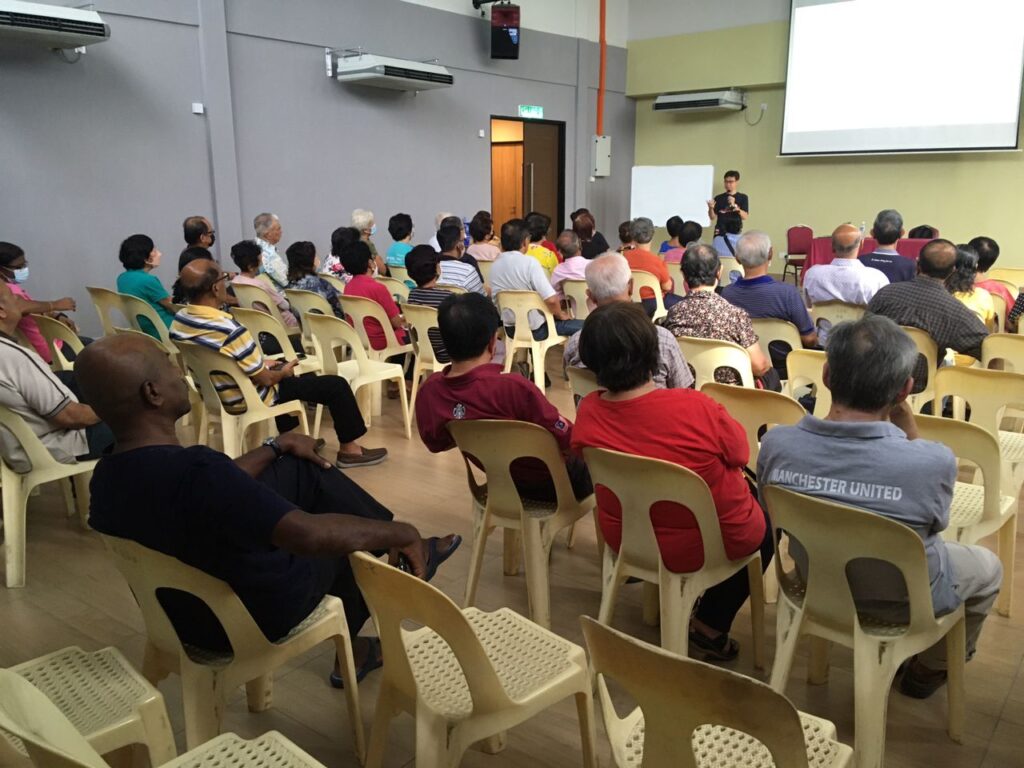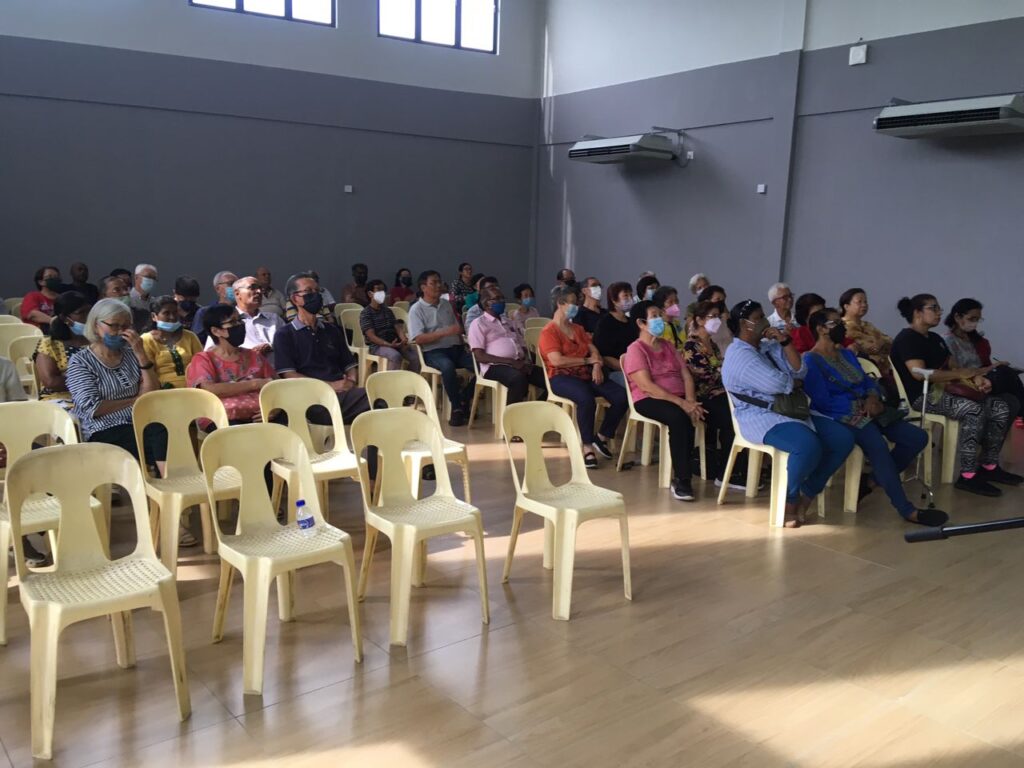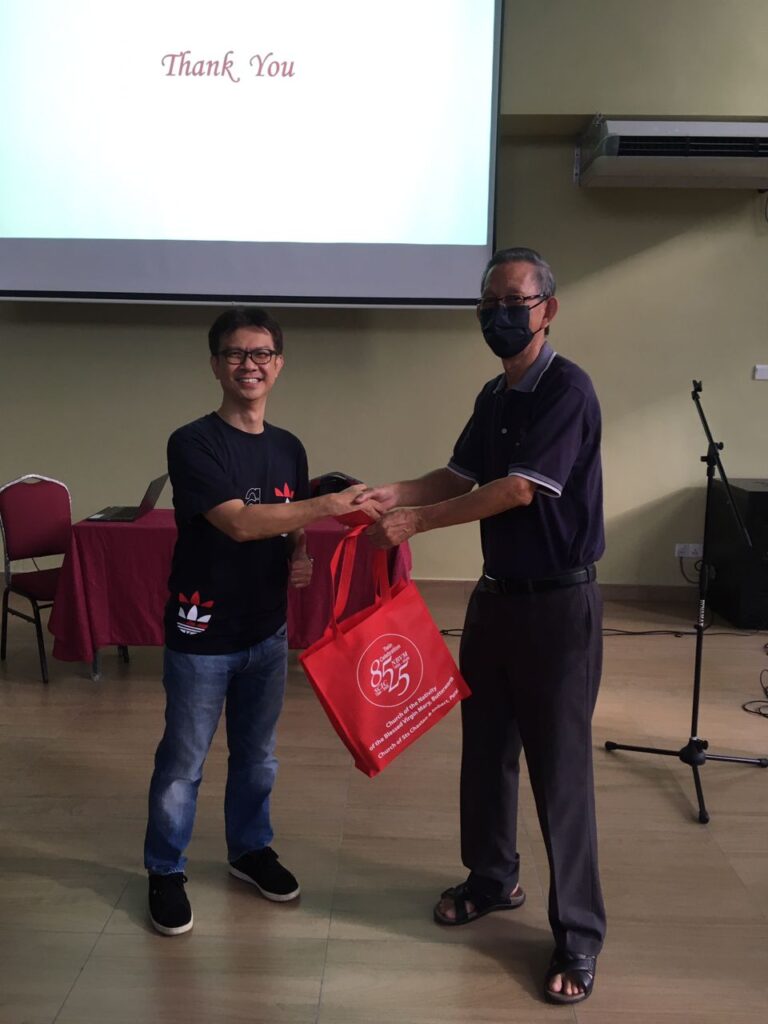Senior Citizens Tea Talk: SCAM ALERT!
Anthony D’s sentiments “It was an informative and enlightening talk” were echoed by many of the 60 senior citizens who were held spell-bound and focused on “Scam Alert” delivered by Mr James Chin, an investment banker and professional trainer at the auditorium of the Church of the Nativity (NBVM) on Wednesday, 7th June.

This talk was an effort by the parish to make senior citizens aware of how scammers operate and how they can try to protect themselves from being scammed through phones, handphones and emails.
After a short welcoming speech by Stephen Francis, the emcee and a prayer by William Henry, the talk kicked off with Mr James Chin recounting a scary but true incident where he and one of his colleagues were ambushed and robbed in broad daylight, while trying to transmit money without armed guards, to another bank for safe keeping. Their car windows were smashed by the robbers. Pieces of glass were everywhere. The back tyre of the car was slashed by a sharp object to prevent them from giving chase. The robbers took the money and left them in great shock.

Those days armed guards were few and, knowing this, robbers dared to take great risks to become rich.
Mr. James expressed that the ‘robbers” of today are the modern-day scammers. They hide anc work behind computers and handphones and take less risks of being arrested as the borderless world opens. With video clips, examples from the Internet and life, James enlightened and captivated the audience’s interest for one and three quarter hour including a Q & A session.
Scammers resort to various tactics. To start off, James posed some photos of familiar faces who look and sound like somebody they know but may not be the person. They are scammers who would randomly call the house and hand phones of their would-be victims. They posed as officers from government agencies and legitimate websites, such as income tax departments, police, banks, reminding them of settlements for bank loans, taxes and fines; ‘fishing’ for personal information such as credit card numbers, passwords or bank information. Many fall victims to these scammers, mainly out of fear or ignorance especially as there is always a note of urgency in these calls.
At other times, the scammers would pose as close friends or civic-minded people, appealing for donations to worthy causes or charity. They would also try befriending lonely and elderly people, offering them love and support and eventually scam them of their life’s savings. Now with e-banking and on-line marketing, these scammers who pose as agents or e-marketeers entice them with incredible offers. Once the caller asks for any of your personal information, it’s a red flag. Be wary. Do not give him your bank account numbers, phone numbers or passwords, as they are able to hack into your systems and withdraw your cash for themselves.
Lastly, Mr. James reiterated that yourpersonal data is never safe as they can be sold. His advice to those present never to divulge personal data to anybody who asked for it. Besides this, he advised his listeners not to entertain any phone or WhatsApp calls or short messaging service (sms) from unfamiliar people or phone numbers. If it’s an urgent matter, they will call again. Always call back to the official number of the agency, company, bank or person to confirm if such an offer or request has been made. For him, anything or any offer that is too good to be true with little risk, is most probably a scam.His parting advice is not to be greedy but be rational and not respond in haste or fear. He also suggested that the would be ‘victim’ discusses the matter with a trusted person.
Based on a recent survey in February 2023, Mr James warned that a new group that is at risk of being scammed are those aged between 17 to 40 because of their online habits. They lack or are careless in cyber security knowledge and skills. They also do a lot of sharing on social media and online banking, online shopping and so are more ‘open’ to cyber attacks and scammers.Many questions were raised in the Q&A session. His advice is always to report suspicious callers to the Malaysian Communications Multimedia Corporation (MCMC) for further action.
The session ended with a vote of thanks to Mr James and all present. A token of appreciation was presented to Mr James Chin. High tea was served after the talk. (Senior Citizens)


